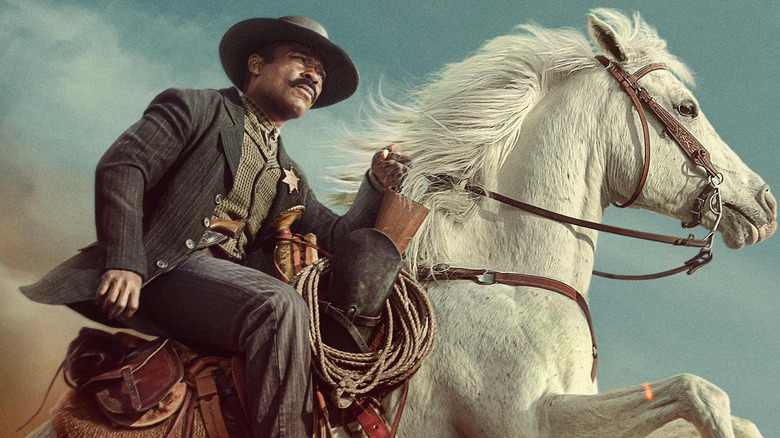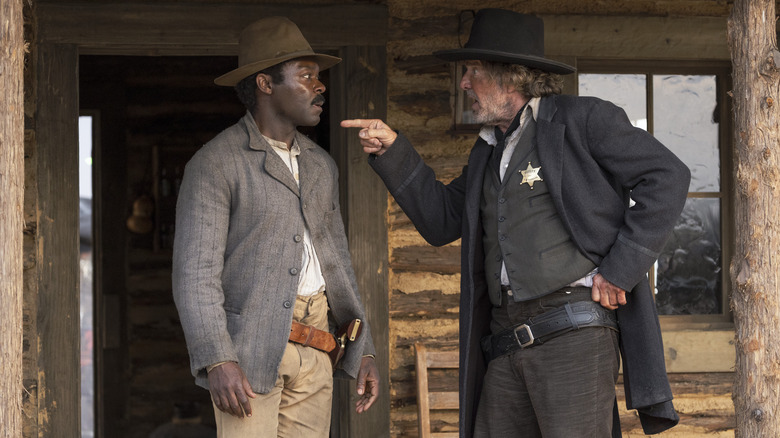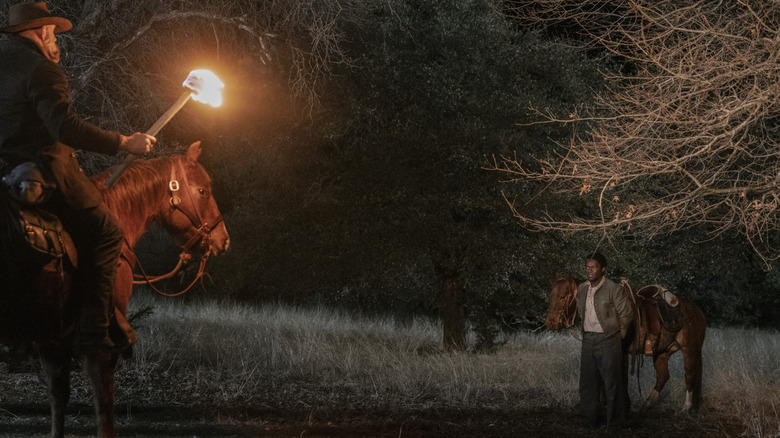Lawmen: Bass Reeves Director Explains Why Taylor Sheridan Has 'Done It Again' - Exclusive Interview
The anticipation for the new Paramount+ series "Lawmen: Bass Reeves" has been percolating ever since the wildly popular "Yellowstone" prequel "1883" aired its final episode back in early 2022. At that time, "Bass Reeves" was rumored to be an offshoot of "1883," which starred Tim McGraw and Faith Hill as ancestors of Kevin Costner's John Dutton character. But with "Lawmen: Bass Reeves" set to premiere on Sunday, November 5, on the premium streaming service, it has become clear that that's no longer the case.
While "Yellowstone" mastermind Taylor Sheridan is still involved with "Bass Reeves" as an executive producer, he has largely passed the reins to such rising stars in the industry as Chad Feehan, who takes top billing as creator/showrunner, and director Damian Marcano, who spoke exclusively with Looper about the highly anticipated series based on the real-life lawmen Bass Reeves.
A former slave-turned-Deputy U.S. Marshal, Reeves was the first Black man to hold such a position west of the Mississippi River in the late 1800s. While "Lawmen" fills in some historical blanks with dramatic flourishes, the eight-episode series provides a good introduction to an underrepresented icon who many people may not be familiar with. Starring David Oyelowo, Dennis Quaid, and Donald Sutherland, the Western fits right into Sheridan's television empire that was built around "Yellowstone," yet still stands squarely on its own.
During his exclusive interview with Looper, Marcano discussed working with living legends like Oyelowo, Quaid, and Sutherland, and how he hopes "Lawmen: Bass Reeves" reshapes people's thinking about the foundation of America.
The all-star cast helped elevate everyone around them
What was it like working with David Oyelowo? Do you have any memorable stories you can share involving him?
It was a joyous time, man. You know David's work, and if you are a director, you're like, "Wow, I get to work with this guy. He's done all of these great things." But the memorable thing for me above it all was realizing that he is this very nice, down-to-earth, decent human being. I always tell people I am a Rasta man before I'm a director, so those things still mean a lot to people like me. From that moment forth, all of the fears or questions or anything else you had all went away, because you are in a very welcoming environment with someone who is out to do something purpose-driven, just as much as you are ... He is a true gentleman, and he's a great guy. That was very nice to see on top of all the accolades.
Meanwhile, Dennis Quaid and Donald Sutherland are obviously impressive legends also. What was it like working with them?
Brilliance, man. Brilliance. Dennis has his own type of lightning in a bottle, and it's my job every day at work to try to capture it. He never, ever let me down — never. Not once in a scene. It always was like, "I need this moment of Sherrill Lynn to come in and give me a little pop." And it was always brilliant.
From the moment Donald Sutherland ever appeared on our set, a quiet went over the entire production because it was like, "He's here." Like, "What could we learn in this moment? What could he do for this character and all of our other actors?"
That was a brilliant thing about this show. Everywhere you turn, there was another actor that was so prepared for the role, and every day they came and we were like, "Oh, this guy's going to sink." Then we were like, "No? Wow." Because they were all up there swimming with the greats.
Were you a fan of Taylor Sheridan's work before joining this?
Yes.
Where do you think "Lawmen: Bass Reeves" fits into the television universe he has built around "Yellowstone"?
I was a fan of his work, and I joked with him about it because my wife watched all of his shows. I did not understand what she was watching. I was like, "You're watching Westerns now? What is going on?" But she was the first person that said to me, "You need to work with this guy ..." She was talking to me from what was happening script-wise in like "1883."
"Lawmen" is a beautiful addition to that. It's its own thing. It's not "1883" by any means; it's not "Yellowstone." It's not an origin story of that [series]. I love the fact that Taylor has done it again and reinvented the wheel. Then there's [creator/showrunner] Chad Feehan, who — no offense to any of the other guys — but Chad's my favorite writer. He is doing some amazing stuff. Just as much as David brought himself to this and I brought myself to this, [Chad brought himself too].
Marcano hopes the series moves people
Do you see the series as helping to redefine the narrative of what people think about the foundation of America?
Yes, and I speak on that as an immigrant coming to America. I'm from Trinidad, so there is a certain immigrant history, if you will, that I was given of this country, and that history is from a very wide lens. It says, "This group of people was here, they did this to this group of people, and then this happened to the country as a whole." When I first decided to do this [series], I was talking to Taylor [Sheridan], and he said, "Our job is to turn the mirror. The mirror doesn't make anything up — it just shows you the way that things are."
For me and for David [Oyelowo], we recreated some moments of history that ended up feeling so real. I'm not talking about the acting part — I'm talking about scenes that were nonverbal. We're standing somewhere at a settlement camp and we can't figure it out, but we all became emotional. We all have tears in our eyes. It was hard for me to direct because I was like, "What is going on?" But the fact is that what we've recreated is larger than us. What we've recreated is a 4D version of our history, and it is going to be emotional to take it in.
What do you hope audiences learn or take away from this series?
That history isn't so black and white. It's easy for Black people to say history was one way, and it's easy for white people [to say the same thing]. No matter what race you represent, I'm sure we were all taught history. I love shows like this, or literature like this, that are able to put each of us who already think we know something back into it and then ask, "You still feel the same way?" It's not with preaching and it's not with judgment. It's just saying that, in 2023, we should have an open mind, and we're supposed to be so much smarter as people than we were in 1883. Let's use that new open mind to rejudge this.
It's a great introduction to a history few people may know about.
If there was a cheat sheet on the story [of Bass Reeves], this is a great version. Plus, you can be a fan of cinema to love this show and be like, "Wait, this guy was real?" Yeah, he was — go look him up.
"Lawmen: Bass Reeves" premieres on Sunday, November 5, on Paramount+.
This interview has been edited for clarity.


